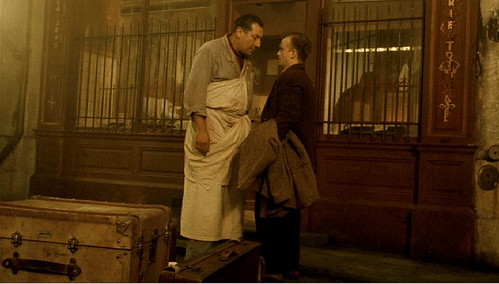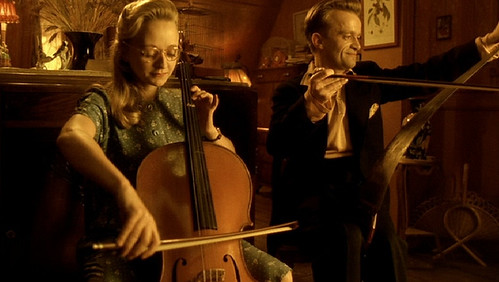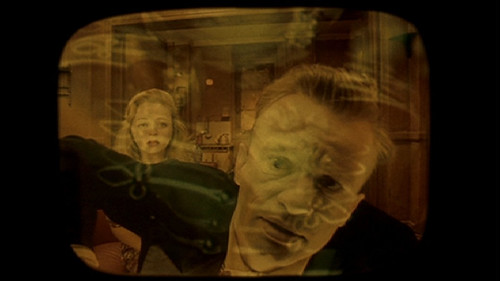Delicatessen, which I posted some images of before, is a great film for anyone interested in any of the following issues: post apocalyptic tableaus, vegetarianism, and masculinity. Jeunet and Caro's first film is a bit more meaty (ha) than Amelie, although it is still as heartwarming and light. Despite its dark subject matter, Delicatessen could easy be described as a romantic comedy.

As my sociologists friends have told me, masculinity and the act of meat-eating are very closely related. That's why I couldn't help viewing this movie partially as a testosterone fueled battle between the cleaver-wielding butcher and the sensitive, vegetarian clown who is his would-be victim. Obviously, there's more to it than that. Most of the other dubious characters in this film demonstrate various power struggles in their daily interactions, and practice other methods of control over one and another. At the top of the heap is the butcher, who controls everyone, because he controls the capital, which is meat.

This simple clown, Louison (Dominique Pinon) demonstrates the importance of art in a society that is rapidly collapsing into a hellish morass of selfish survival instinct and even cannibalism. The weapon Louison wields is a sword, and only so long as he can use it as a musical instrument.

Then there was Shutter Island, which I saw in the dollar theater. I'm honestly not very well versed in Scorsese, and from what I hear, this is something of a departure from his usual thing. I really enjoyed it. Going in, I was aware that it was a psychological type of thriller. Outside of memories, the narrative is confined to the island where US Marshal, Teddy Daniels (Leonardo DiCaprio) is trapped. He is imprisoned on the island, just as he is imprisoned in his own mind, and wandering manically through its labyrinths and puzzles to unravel the truth.
 This film utilizes both dream sequences and flashbacks in order to construct the madness of Daniels, and to demonstrate the way reality, fantasy and memory have been layered together to create his delusions. Dreams can be really tricky territory for films to go into, just like flashbacks can be. They're an enticing short-cut to use for character development, etc. And they have become so omnipresent, filmmakers seem to jump into the flashback without thinking about whether this is actually the most effective means of conveying the information. That being said, it probably would have been extremely difficult to make this film without them. But I found the flashbacks jarring at times, because the island, and the sense of entrapment it creates is so central to the movie.
This film utilizes both dream sequences and flashbacks in order to construct the madness of Daniels, and to demonstrate the way reality, fantasy and memory have been layered together to create his delusions. Dreams can be really tricky territory for films to go into, just like flashbacks can be. They're an enticing short-cut to use for character development, etc. And they have become so omnipresent, filmmakers seem to jump into the flashback without thinking about whether this is actually the most effective means of conveying the information. That being said, it probably would have been extremely difficult to make this film without them. But I found the flashbacks jarring at times, because the island, and the sense of entrapment it creates is so central to the movie.The dreams are quite haunting, though. Scorsese uses these images to construct Teddy's inner life, and to carefully place us inside his perception. At the end, we discover that the doctors have constructed an elaborate alternate reality in which Daniels can play out his fantasies, as he discovers this new order, so does the viewer.
 Despite its disputable shortcomings, Shutter Island ignites an interesting discussion of humanity's capacity for violence. One thing I did like about the dream sequences was the way they aligned the violence in Daniel's own life with the violence he witnessed at the concentration camps. Teddy Daniels becomes violent when faced with the extreme examples of violence he has encountered himself.
Despite its disputable shortcomings, Shutter Island ignites an interesting discussion of humanity's capacity for violence. One thing I did like about the dream sequences was the way they aligned the violence in Daniel's own life with the violence he witnessed at the concentration camps. Teddy Daniels becomes violent when faced with the extreme examples of violence he has encountered himself. This was a rushed effort, so I apologize if its less than polished. On a similar note, I am soon packing up my life and moving to Chicago. So, an unofficial hiatus might be forthcoming, if I don't find the time to write in between all my other preparations.
This was a rushed effort, so I apologize if its less than polished. On a similar note, I am soon packing up my life and moving to Chicago. So, an unofficial hiatus might be forthcoming, if I don't find the time to write in between all my other preparations.Shutter Island images 1 and 2
and 3


Louison uses a saw, not a sword? Anyway, the first screen capture is lovely. Your archive is starting to look pretty damn good!
ReplyDeleteoops. Saw is what I meant.
ReplyDelete